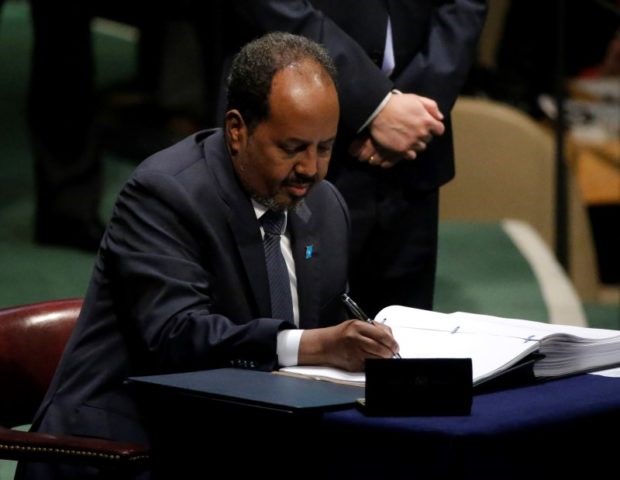
Thursday August 11, 2016

Somalia’s President Hassan Sheikh Mohamoud signs the Paris Agreement on climate change at the U.N. headquarters. Reuters
Mogadishu-Somalia’s President Hassan Sheikh Mohamoud will be completing his fourth year in power next September. In his term, Somalia shared the world many political and security turbulences.
His Excellency had fought fierce political battles, and survived many parliamentary attempts to oust him.
In a relatively short period, Sheikh Mohamoud went from being an academic researcher and a civil peace activist to a political party leader, becoming in 2012 Somalia’s first internally elected president since 1991. Four of his predecessors were elected and put in authority with foreign backing, and had to leave the country once their term came to an end.
However, despite the tradition, Sheikh Mohamoud says that he will not exit the country once he steps down from authority, but will live out the remainder of his life in Somalia.
In an interview with Asharq Al-Awsat newspaper, the President spoke about his experience with being in authority, and him running for another term. Sheikh Mohamoud also pointed out to his presidential campaign and what progress was made on that matter.
Political sides in Somalia had agreed in 2013 to a score of measures aiming to rectify the national political process. At the time the agenda for reform was being called “Vision for 2016.”Sheikh Mohamoud explained that the most important features brought about by the roadmap were improving the democratic process and establishing political parties. Holding elections, revision of the constitution and finalizing federalism are also a part of the plan for reform.
According to the president, a progress on the roadmap had gone a long way—since 2013, most of Somalia’s federal states had been established save one, and will be finalized prior the upcoming elections.
Sheikh Mohamoud pointed out that Somalis now enjoy the benefits of democracy, in which each state is ruled by a locally elected authority without being compelled into anything.
When asked on the efforts spent by the government to fight the notorious Al-Shabaab(HSM) militant organization, Sheikh Mohamoud said that since he rose to power in 2012, the fight against the terror group had been ongoing. According to the president, the government had recorded many successes in defeating and repressing hardline HSM members.
Despite the relentless efforts, some HSM militants still exist in the capital’s surrounding areas. Nonetheless, after four years into countering HSM terrorism, Sheikh Mohamoud stressed that the number of terrorist gunmen had been considerably diminished across a wide array of Somali cities.The president also highlighted that the fight against the HSM in his country, is not exclusively a Somali matter, but reflects a regional and international concern. The HSM still is a role-player when addressing the terrorism wave raging across the world, said Sheikh Mohamoud.
Looking at the brighter side of developments in Somalia, Sheikh Mohamoud says that for the first time in four years elections are being held in all seven states, and are expecting the participation of 15,000 electorates to represent their tribes—unlike previously held elections that used to be held in Mogadishu due to security reasons.
The president also highlighted that over 40 embassies and delegations arriving to Somalia can be used as a positive indicator for the security question in his country. “Somalia is on its way to recovery,” said Sheikh Mohamoud.
Even though Somalia shares excellent ties with a number of Arab countries around the world, Sheikh Mohamoud labeled the relations shared with the Kingdom of Saudi Arabia as outstanding. In his last meeting with the Custodian of the Two Holy Mosques King Salman bin Abdulaziz, the Somali President had discussed many bilateral ties and regional affairs.
Somalia is a partaker in the Saudi-led Arab coalition to save Yemen’s legitimacy, and also a member at The Islamic Military Alliance to Fight Terrorism (IMAFT).
Sheikh Mohamoud also said that Saudi Arabia currently aids Somalia’s restructuring of the army, and had been visited by a high-ranking delegation sent from the kingdom. The delegation will assess the needs of the national army and the Saudi contribution given to its restructuring.
As for the Yemen crisis, Sheikh Mohamoud says that his country’s stance was made clear on backing the legitimate government represented by President Abd Rabbuh Mansur Hadi. He said that his country stands against any attempt on shifting powers in Yemen, and that Somalia had stood by the legally elected Yemeni government since day one. A similar stance was expressed on Somalia’s standpoint from the recent Turkey situation after the abortive coup.
When asked on cutting ties with Tehran, Sheikh Mohamoud said that Iran represents a clear threat to all Arab countries. He said that the threat is a simple and recent turn of events, but a long known truth.
As for Somalia, after two years of monitoring Iranian activities in the country, it was evident that a flow of foreign security, ideological and cultural currents were coming into Somalia. For his part, Sheikh Mohamoud said that many complaints were made to Iranian authorities, however, they all went unnoticed.
Given Somalia’s already unstable situation, with a great diversity of ethnic backgrounds, and incoming religious ideologies- some of which pro-radicalism, such as the HSM case- the President explained that ties were cut with Tehran to prevent a further proliferation of foreign ideologies in Somalia.
Despite that Somalia is in need of all the support it can get, Sheikh Mohamoud says, “We will not accept for sectarianism to be planted into our soil, so that it backfires in 10 years.”